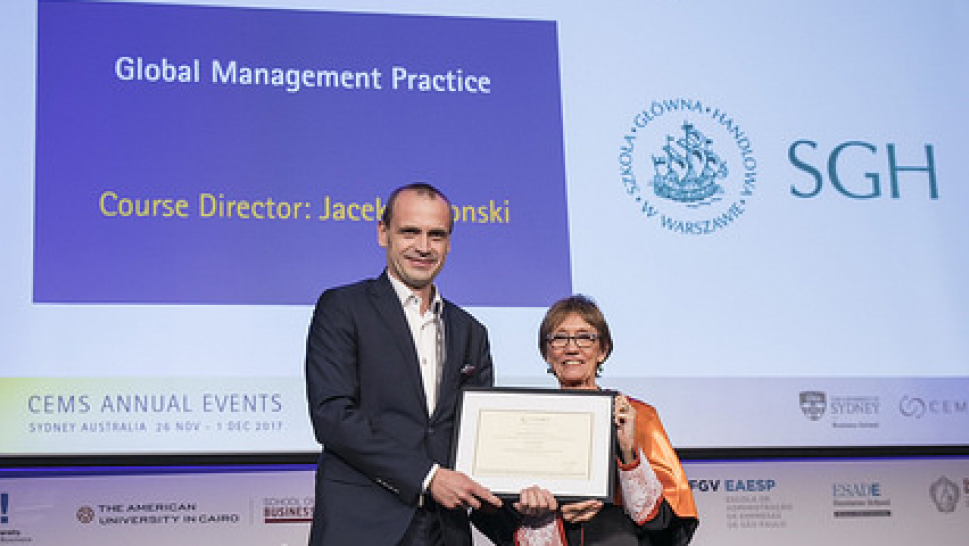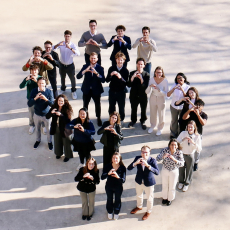The fundamental objective of this course, as I perceive it, is to develop among students the attitude of “Reflective Practitioner” (source: S. Junghagen, The Need for Managers as Reflective Practitioners. In: The Future International Manager, L. Zsolnai, A. Tencati (eds.), Palgrave Macmillan, New York 2009, p. 9-22.). The main focus of this course is on managing people in global, international and cross-cultural settings. It should prepare students for assuming international managerial positions by helping them to reflect on several important global issues they are going to face in their careers but also by improving their decision-making skills in such an ambiguous and complex international environment.
I use a variety of teaching methods designed to stimulate class participation and interaction with course content. The course combines theoretical and experiential learning through the use of case studies, group projects, class discussions, on-line participation and lectures. The educational model in this course involves new roles for both professor and students. The student leaves the traditional passive behavior of a knowledge recipient to become an active participant of the learning construction. Rather than behaving as an expert in their area, the professor takes on the responsibility of a tutor, facilitator and guide of the teaching-learning process.
A group project plays a crucial role in the course. I personally assign students to groups, making them as diverse as possible. The project is called “Global management challenges”. Each group chooses a specific topic and prepares three assignments. Instead of traditional academic essay, students prepare a consulting report, which in most cases is quite a new and very practical experience for them. Instead of the traditional “talking heads” presentation, groups produce a video presentation in a form of a short movie or video clip, consisting of pre-recorded student presentations, animations, interviews, music and info-graphics. The video presentation is a very challenging task but leaves a lot of space for imagination and creativity. The group project is concluded by an interactive session with all students. We also use an exercise called “friendly challenge”. Each consulting report, video presentation and interactive session is evaluated (in writing and orally) by another group.
The learning outcomes are measured and observed not only during the final exam but also throughout the whole course. Students write self-awareness exercise. They prepare case write-ups in which they are asked to make decisions, justify them but also directly apply course readings. In-class individual and group exercises, class discussions and on-line participation forum provide a lot of information about the learning process.
I hope that self-awareness, understanding and appreciation of diversity, open-minded approach, reflection on complexity of the interconnected world but also the ability to make educative and justified choices are important things students will take away from this course. Most CEMS students are about to work internationally, so in my opinion, such courses can add a small but crucial contribution to their future endeavors.
"What I found unique about this course was that Mr. Mironski had the most diverse bundle of teaching methods that I had experienced so far. Besides the midterm and the exam, mostly common to every course, we had 3 assignments reflecting different real-life issues that usually arise in an international management environment, in which we had to give our perspective and propose a solution. Also, we had an online forum where the professor would put up questions in regards to cultural differences and ethical dilemmas, and students engaged in research and constructive discussions. Finally, in groups, we had to work on an international management topic through doing a consulting report, an explanatory and complementary video, and teaching a class to our peers. All of this combined gave us a truly hands-on experience inside the classroom, backed-up with strong theoretical fundamentals. I aspire to pursue an international career and Mr. Mironski put us in front of the biggest and most common challenges in an international corporate context, teaching us methods on how to face and overcome them," says Margarida Veludo, one of the CEMS students participating in the course.
"This course was really diversified. Every lecture was different, the tasks and assignments varied a lot, our Professor always had new ideas on how to present different topics to us. I particularly enjoyed our group project which one part was to prepare videos - it integrated us well within groups, it made us aware of global management challenges and in the same time it was really funny. I especially liked it when we talked about cultural differences influencing global management. It made me even more decided to look for a job where I could work in an international environment," says Gosia Gawlik, another CEMS student.
One of the most remarkable moments come from watching video presentations. CEMS students showed dedication, out-of-the-box approaches and sense of humor. Some video presentations are so good, attractive, professional and educative that with the permission of the authors I use them in my other classes, including executive MBA courses.
Working with CEMS students is an on-going and never-ending development, fun and privilege. I enjoy their enthusiasm and hard work. It’s good to have such partners in this educative journey.
I would like to underline that a lot of inspirations for this course came from the Global Leadership and Cross-Cultural Management CEMS Faculty Group. We meet at least once a year, we constantly share our experience and best practices, support and inspire each other.




